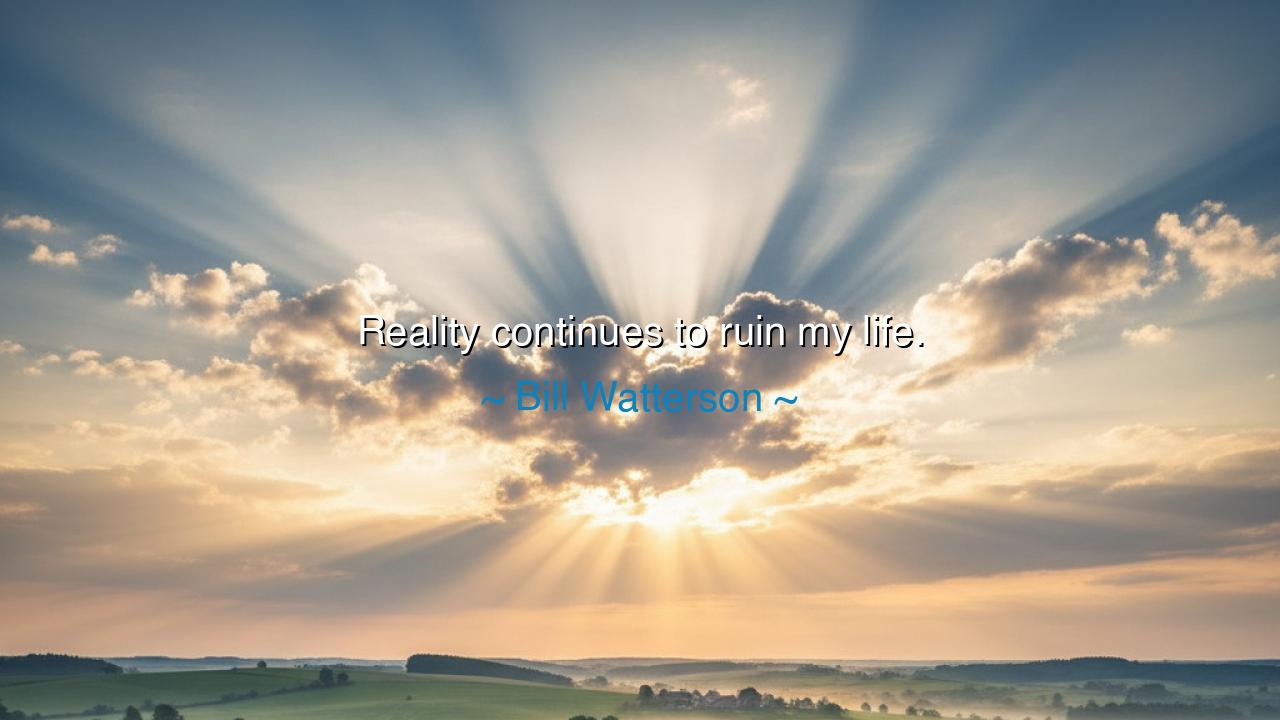
Reality continues to ruin my life.






"Reality continues to ruin my life." This seemingly simple yet profound statement by Bill Watterson speaks to the tension between the dreams and ideals that we hold within ourselves and the often harsh, unrelenting truth of the world in which we live. Watterson, through the character of Calvin from Calvin and Hobbes, captures a universal sentiment—reality is not always the gracious, benevolent entity we wish it to be. Instead, it is a force that constantly intrudes upon our fantasies, our hopes, and our aspirations, demanding our attention and often disrupting our peace.
In the ancient world, philosophers such as Plato and Socrates pondered the nature of reality and how it interacts with human perception. Plato’s famous allegory of the cave illustrates how illusion and reality can blur. The prisoners in the cave mistake the shadows they see on the wall for reality, unaware of the world outside. When one prisoner escapes and sees the sun, he is overwhelmed, realizing the truth about existence. Yet, the very truth he discovers is harsh—so much so that when he returns to the cave to free his companions, they reject him, preferring the comforting shadows of their ignorance to the pain of confronting reality. Like Plato's cave dwellers, many of us yearn to escape the confines of the world as it is, seeking refuge in our imaginations and fantasies, but reality is always waiting at the door, ready to intrude upon our lives.
The Romans, too, were acutely aware of this battle between idealism and realism. In the epic tale of Cicero, the great orator and philosopher, we see a man who spent much of his life attempting to reconcile the duties of the state with the ideals of justice and morality. Despite his profound understanding of the good and noble, Cicero found himself caught in the political realities of Rome, unable to fully realize his lofty principles in the face of the corruption and betrayals that surrounded him. Just as Cicero’s ideals were constantly thwarted by the ugly truths of Roman politics, Watterson’s words speak to the struggle many of us face: we are often forced to compromise between the world we imagine and the world we must navigate.
In modern times, we are no strangers to this struggle. The rise of technology, while offering tremendous opportunities, also brings with it a disconnect between our idealized selves and the virtual personas we create. The world of social media, for instance, often presents a version of life that is clean, curated, and far from the complexities of real existence. We find ourselves caught between the beautiful images we project online and the rawness of real life—where relationships are messy, work is difficult, and personal growth is rarely a straightforward path. Much like Watterson’s Calvin, who retreats into fantasy to avoid the dull realities of life, we, too, often seek solace in the digital world, only to return to the discomfort of our physical existence.
Yet, Watterson’s statement, while tinged with frustration, is not merely a lament. It is a call to action, a recognition of the struggle between the ideal and the real. In his playful yet poignant manner, he suggests that while reality may indeed be a force that disrupts and often ruins our plans, it is also the stage upon which we must create our own meaning and purpose. Calvin, in his adventures with his stuffed tiger Hobbes, frequently learns that life is messy and unpredictable, but it is also full of wonder, curiosity, and growth. It is within this chaos, this clash between idealism and reality, that we discover who we are and what we can become.
The lesson that Watterson’s words impart is one of acceptance and resilience. While it is natural to wish for a world that aligns more closely with our fantasies, we must also embrace the challenges that reality presents. The truth is often hard and uncomfortable, but it is also where we find the opportunity to grow, to create, and to transform ourselves and the world around us. As Heraclitus wisely said, "The only constant in life is change," and it is through facing these changes with courage that we carve out a life that is rich with meaning, even amidst the chaos.
In practical terms, we must learn to balance the ideals we hold with the realities we face. Instead of avoiding the discomfort that reality brings, let us engage with it fully, knowing that it is in this tension between what is and what could be that true growth lies. Just as Calvin embarks on wild adventures, embracing the absurdity of his world, so must we face the challenges of our own with curiosity, creativity, and courage. Let us no longer be consumed by the idea that reality is something to be avoided, but rather something to be embraced, with all its beauty, complexity, and imperfection.






AAdministratorAdministrator
Welcome, honored guests. Please leave a comment, we will respond soon